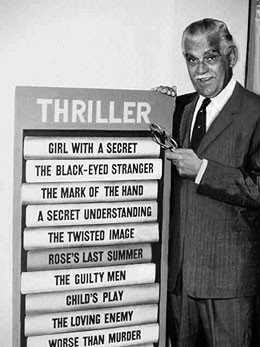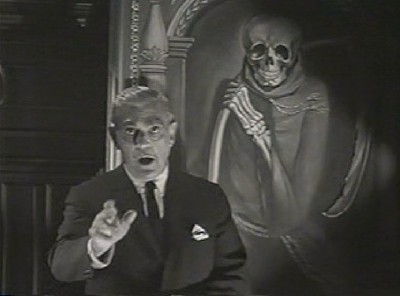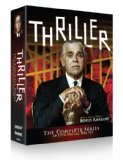| Reviews & Columns |
|
Reviews DVD TV on DVD Blu-ray 4K UHD International DVDs In Theaters Reviews by Studio Video Games Features Collector Series DVDs Easter Egg Database Interviews DVD Talk Radio Feature Articles Columns Anime Talk DVD Savant Horror DVDs The M.O.D. Squad Art House HD Talk Silent DVD
|
DVD Talk Forum |
|
|
| Resources |
|
DVD Price Search Customer Service #'s RCE Info Links |
|
Columns
|
|
|
Thriller - The Complete Series
But at last it's here, though in the form of a pricey boxed set: a 14-disc collection of the entire series, all 67 hour-long episodes with an SRP of - gulp! - $149.98. (Of course, most websites are selling it for considerably less, as I write this most are offering it for around $107.)
Is it worth it? Every penny. For one thing, even at full retail it still works out to just $2.23 per episode (a far cry from the $35.95 I used to pay for just four Twilight Zone episodes on VHS every month!), plus this supplements-stacked edition comes with more than 50 hours of special features, mostly in the form of infectiously enthusiastic and informative audio commentaries and isolated music scores. The latter is almost like owning a big stack of soundtrack CDs and features some absolutely outstanding, wonderfully moody music by Jerry Goldsmith and Morton Stevens.
Does it still hold up? Yes, in the sense that the best Thrillers are uniquely scary, unsettling, and disquieting, while others are merely infused with wonderfully evocative Gothic atmosphere, and bolstered by good performances, direction, photography, set design, and scoring.
But that's only part of the story. Thriller is remembered by some as a horror anthology exclusively, which isn't the case at all. Initially patterned after Alfred Hitchcock Presents, Thriller was as much a mystery-suspense/crime-thriller series as it was flat-out horror. And those quick to dismiss the crime shows in favor of the more lurid horror episodes do Thriller a disservice, because some of these are in the same league quality-wise as the horror shows.
Image Entertainment did an outstanding job with its "Definitive Edition" full-season sets of The Twilight Zone in 2004 and 2005. Thriller - The Complete Series isn't quite at that level, neither in terms of the video transfers nor the flimsy, unimaginative packaging, though the extra features come awfully close. Partly this is forgivable, what with the DVD market now in freefall, and probably fans of the series should be thankful this is getting released at all. Still it's the shows that really count, and they live up to their reputation.
Thriller was not just another horror/crime anthology. In fact it was sold to the network without so much as a pilot, highly unusual at the time, because of the man whose recently-formed production company was co-producing the series: Hubbell Robinson (1905-1974). Active in radio from 1930 and television from its inception, Robinson was an executive behind some of the most prestigious shows of the 1950s, most notably Playhouse 90, the apex of television's Golden Age. Among his many other accomplishments, Robinson pushed for a greater minority presence on network shows. Unceremoniously booted off CBS by Smiling Cobra James Aubrey, Robinson formed his own production company and produced Thriller and 87th Precinct in quick succession. Cult actor Robert Lansing, star of the latter, plays an almost identical character in one of Thriller's best (and earliest) thrillers. Additionally, it was probably Robinson's reputation that sold the series to Karloff, who had starred in a number of shows that Robinson had executive-produced, including a famous adaptation of Heart of Darkness, with Karloff as Kurtz.
Exactly how much influence Robinson had over Thriller is debatable. Less than Serling on Twilight Zone, certainly, and probably even less than Twilight Zone's producer Buck Houghton, was on that show. In fact Thriller was at least as much a Revue show, that company being the television arm of MCA, which at the time Thriller premiered had recently purchased the Universal studio lot but technically not Universal-International, the film company.
MCA had started out as a music-booking agency but really blossomed under agent Lew Wasserman and his formidable roster of Hollywood clients, headlined by actor and SAG President Ronald Reagan, James Stewart, Doris Day, Rock Hudson, and director-producer Alfred Hitchcock. MCA clients like Reagan and Hitchcock lent their name and presence - but not a whole lot in terms of actual participation - to hugely profitable Revue anthology shows like General Electric Theater and Alfred Hitchcock Presents, alongside more conventional Revue programs like Leave It to Beaver and Wagon Train. These shows were initially shot at the Republic Pictures lot in Studio City (Republic having all but collapsed by the end of the fifties), but by the end of the decade, the rapidly expanding Revue/MCA had bigger fish to fry and moved a couple miles east to the much larger Universal City.
By 1960, the half-hour Alfred Hitchcock Presents was losing its edge, but still profitable. Thriller, an hour show, seemed like a good way to milk the format some more; perhaps from the beginning its producers hoping to adapt stories already owned by MCA that for one reason or another didn't quite fit the Hitchcock mold.
In any case, Thriller initially resembles Alfred Hitchcock Presents much more than Twilight Zone, while Thriller's second season, oddly, looks a lot like The Alfred Hitchcock Hour, which replaced Thriller after it was cancelled. Even Thriller's iconic credits, dominated by crisscrossing lines, suggest the graphics of Hitchcock collaborator Saul Bass. Moreover, the Universal-Revue house style and common use of the Universal backlot and its standing sets (including the Psycho house) add to the Hitchcockian connections.
The reason Thriller was cancelled is open to speculation, but some insist Hitchcock himself killed it, that he was unhappy having to compete for stories and talent with a rival show made by his own production company, for crying out loud. In any case, one could virtually slap Thriller credits on an Alfred Hitchcock Hour show like "The Jar" (and vice versa) and no one would be any the wiser.
Thriller itself isn't particularly distinctive, rising or falling on the quality of individual episodes. It doesn't have the generally consistent tone and voice of Twilight Zone, infused with and tied as it is to Rod Serling. It doesn't even have the drollness of Alfred Hitchcock Presents, the playful irony and twist endings that made it so distinctive. Karloff is a wonderful mood-setting host but he's gone, never to return, after his opening remarks. Like Hitchcock's infrequent directorial offerings on his series, Karloff seems to have been contractually obligated to headline a couple shows per season, but these aren't Thriller's best; the show's producers didn't seem to understand his appeal, or how best to use his talents. They also saddled him with an awkward catchphrase, "As sure as my name is Boris Karloff...this is a Thriller!" as if the TV audience would mistake him for someone else. "Look ma, it's Fred Astaire!" (who was himself hosting another Revue show, Alcoa Premiere). And as one of the audio commentators points out, in a sense his name wasn't Boris Karloff at all: his real name was William Henry Pratt.
According to television historian Stephen Bowie (who was of enormous help in preparing this review), if Thriller has any particular voice it probably belongs to William Frye. He took over producing chores halfway through Thriller's first season, and steered it more-and-more toward the Gothic horrors for which it is best known, and who, according to Bowie, had a fondness for older stars and character actors that in turn added color to the series (such as genre star Henry Daniell, who turns up frequently); and writer Robert Bloch (fresh from a Hitchcock assignment himself, Psycho), who wrote or adapted many of the best Thrillers and Alfred Hitchcock Presents until the former was axed and Bloch shifted his focus toward The Alfred Hitchcock Hour.
Though Thriller lacks a unique and consistent voice, this very malleability also has certain advantages, in that its absence of a weekly formula and predictable style helps episodes like "Pigeons from Hell," probably the scariest of all Thrillers because it's so unlike anything else on network television, before or since. In this show two brothers, their car disabled, seek shelter in a spooky old Louisiana mansion. From this generic beginning the episode (directed by One Step Beyond's John Newland) moves in one unexpected direction after another, generating almost unbearable suspense and anticipation for the unspeakable menace prowling about upstairs.
Also unlike other network shows, including Twilight Zone and Alfred Hitchcock Presents, each generally filmed in that competent, if flat, 35mm style of early-1960s television, the best horror Thrillers push the limits of television lighting, with some episodes a lot more black than white, with long dark shadows and half-lit faces dominating, stylistically more in line with the Val Lewton-produced horror films of the 1940s than anything on television in 1960-62 (although Conrad Hall took The Outer Limits in interesting new directions soon thereafter). And like Lewton, Thriller shows little while suggesting much, working best when no monsters and ghosts are seen at all.
There wasn't time for this reviewer to watch all 67 shows, but again thanks to Stephen Bowie (whose Classic TV History Blog is an absolute must) I was helpfully steered toward the best of the best. Besides the still-unnerving "Pigeons from Hell," "The Grim Reaper" is also outstanding. William Shatner - then one of television's most sought-after leading men for anthology shows like this - stars as a man concerned that his eccentric, rich aunt (Natalie Schaefer) may be tempting fate after buying a notorious painting of the Grim Reaper, a painting whose various owners invariably wind up dead. It's a marvelously scary show, its hard-earned shocks sold by the actors - Shatner's look of horror near the end is perfect - and Jerry Goldsmith's unconventional, genuinely spine-tingling score.
Shatner had appeared on Thriller earlier that same season in another classic episode, "The Hungry Glass," as one-half of a young couple who move into a seaside New England home with a dark history of killing off its residents with broken glass. Sarah Marshall (who played the frantic mother in the great Twilight Zone episode "Little Girl Lost") has a dual role in "God Grante That She Lye Stille," playing both the 17th century witch burned at the stake (by Henry Daniell) and her cursed descendent.
"The Return of Andrew Bentley," adapted by Richard Matheson, is also good. Both directed by and starring John Newland this time, it's not as good as "Pigeons from Hell" but is terrifically atmospheric nonetheless, with Newland pledging to protect his dying uncle's crypt against the ghost of necromancer Andrew Bentley (super-creepy Reggie Nalder) and his indescribable "familiar."
One of the best Bloch-scripted episodes is "The Weird Tailor," which like "Pigeons from Hell" is memorable partly because it's so wondrously off-kilter and unpredictable. George Macready plays a millionaire father ready and willing to use black magic to bring his dead son back to life. (As Spike Milligan used to say, "I have the body of a 20-year-old. He's in the fridge.") Macready scares off a fortuneteller, but she refers him to a strange man who may hold the secret to all the Black Arts - a used car dealer named Nicolai (Abraham Sofaer)! From here the episode moves in even stranger directions; the less you know, the better.
"The Terror in Teakwood," a Hands of Orlac-type tale of an obsessed concert pianist; "The Remarkable Mrs. Hawk," about a pig-raiser with a secret; "Well of Doom," a cat-and-mouse tale of suspense; and "Yours Truly, Jack the Ripper," about the hunt for a modern-day serial killer who might just be the original Leather Apron himself, are also high-regarded.
Lest they be forgotten, a number of Thriller's mystery-suspense shows are unusually good. The first aired episode, "The Twisted Image," is a clever story with parallel crackpots (played by George Grizzard and a well-cast Natalie Trundy) independently wreaking havoc on Mad Men-type executive Leslie Nielsen. Better still is "The Fatal Impulse," Robert Lansing's 87th Precinct dry-run, with Lansing's detective trying to locate a time bomb that was slipped into an unwitting woman's handbag. Lansing's understated tension sells this show, which surprises with its unexpected an unusually appealing love story. Mary Tyler Moore and Ed Nelson having tiny parts. (They're not introduced by Karloff at the beginning, and their names are buried in the end credits.) "The Fingers of Fear," a modern day M, is also tense and unusual, broaching the subject of child murder (while skirting molestation, at least directly) as Nehemiah Persoff obsessively pursues the serial killer, who may be hulking Robert Middleton, or someone else entirely. Like Hammer's Never Take Sweets from a Stranger, this Thriller was years ahead of its time (1960).
Video & Audio
Thriller - The Complete Series is packaged in a disappointingly flimsy heavy paper stock box, with Karloff's image dominating (see above). Unimaginatively, that same photo is used on all seven slim classes containing the 14 single-sided, dual-layered discs - I guess NBC-Universal didn't provide Image with enough publicity photos from the series. There's no booklet and the episode descriptions found therein aren't very useful, consisting of just title, original airdates, a brief plot description and a list of bonus features, if any. Most discs have five 49-50-minute shows, which are uncut and not time-compressed.
Early ads for the series indicated that they had been remastered but the transfers, while perfectly adequate, don't have that razor-sharpness of Image's Twilight Zone sets, or CBS/Paramount's classic TV titles from the same period (e.g., Perry Mason, One Step Beyond). As noted in one of the commentaries, the 16mm syndicated TV prints tended to have poor contrast and weak blacks, which have been corrected here; the blacks are admirably black and the horror episodes are impressively dark, though sometimes this feels artificially boosted, as the whites on the other end of the spectrum at times seem almost too white. Overall though, these are more than adequate.
The English audio (with no subtitle options) is likewise fine, the music-only tracks coming off especially well. However, the sound effects track on at least one episode ("The Hungry Glass") is messed up somehow, with that show's howling wind sounding like it was recorded on somebody's cellphone.
Extra Features
Dominating the supplements are the commentary tracks, 27 in all. All the classic horror shows have them, while the crime shows are pretty neglected. A few actors and directors turn up to talk about their experiences of a half-century ago - director Arthur Hiller, actors Richard Anderson, Patricia Barry, Beverly Washburn, etc. - but the TV and horror genre historians dominate, and they do a splendid job. Among them, David Schow, Tim Lucas, Gary Gerani, Lucy Chase Williams, Marc Scott Zicree, Jon Burlingame, and Ron Borst. Really the only name missing is the prolific, always entertaining and informative Tom Weaver; ironically even he "appears" on one commentary, in which an archival interview quotes him extensively, with Weaver "performed" by Gerani. It's an odd set-up, but it kind of works.**
Generally the commentaries are outstanding, fun and informative, with well-directed enthusiasm for the series. Beyond the aforementioned isolated music scores, the boxed set includes an extensive still gallery of production and publicity photos, and promos featuring Karloff.
Parting Thoughts
Though imperfect and expensive, Thriller - The Complete Series is an absolute must for horror fans and classic television enthusiasts alike. I've been gobbling them up with reckless abandon, like a box of Hawaiian Host chocolates ("Must stop! Must stop!"). The release is perfectly timed for Halloween. What more could you want? And, despite its minor flaws, it's still one of the Best DVDs of 2010. A DVD Talk Collector Series title.
* Yes, I know it's called the Sy Fy Channel now but it wasn't then. And it's an idiotic name in any case.
** Lucy Chase Williams adds, "I'm sorry that no Image press release mentioned that Gina Gillespie, the child star of "Mr. George," was (in a way) included. Although she declined to actively provide commentary, she gave me an exclusive phone interview which I decided to include on tape by reading all her wonderful comments in first person. Thus, while I provided some additional background to that episode (as did Gary Gerani), Ms. Gillespie's own memories were able to be shared with listeners. Nobody expects a reviewer to watch every [episode], or listen to every commentary, and I don't bring attention to this for my own sake, but for Ms. Gillespie's, whose participation is a true 'extra' to the set."
Stuart Galbraith IV's latest audio commentary, for AnimEigo's Musashi Miyamoto DVD boxed set, is on sale now.
|
| Popular Reviews |
| Sponsored Links |
|
|
| Sponsored Links |
|
|
| Release List | Reviews | Shop | Newsletter | Forum | DVD Giveaways | Blu-Ray | Advertise |
|
Copyright 2024 DVDTalk.com All Rights Reserved. Legal Info, Privacy Policy, Terms of Use,
Manage Preferences,
Your Privacy Choices | |||||||
















